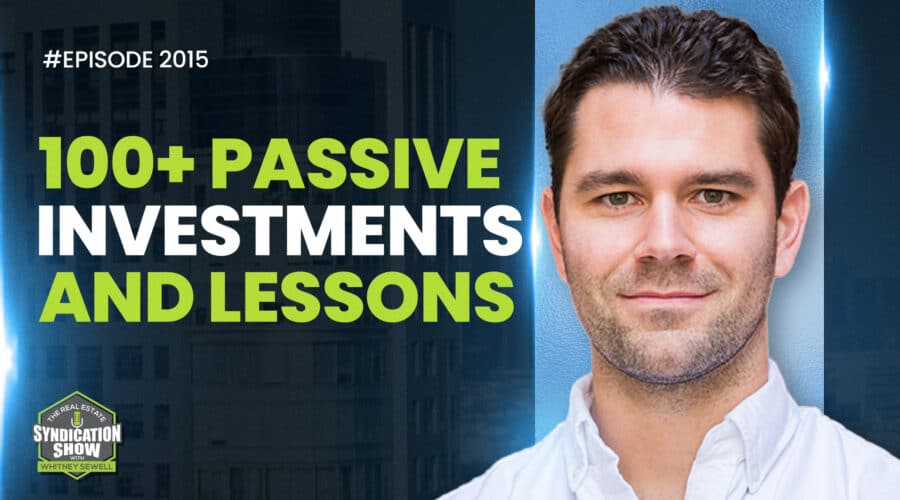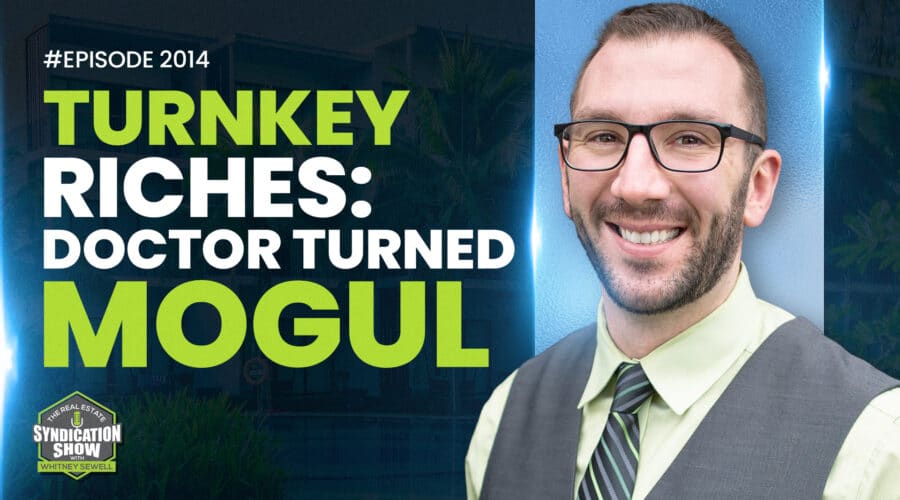Listen to the podcast here:
A Regulation A or a Reg A offering is an exemption from registration requirements. It may seem like a promising term but going through the entire exemption process can be quite daunting. Mark Mascia, CEO of Mascia Development LLC, teaches us how to maneuver around the process of pursuing a Reg A exemption. He goes back to his military and law reinforcement background and how he uses his life skills and knowledge in getting to where he is right now. He highlights the importance of having a good guide like a security attorney and the right networks through the entire process, and touches on capital structures as well as 506(b) offerings.
Our Gracious Sponsor:
Are you tired of answering emails from investors about when they’ll receive their K-1s?
Let The Real Estate CPA handle the accounting and taxes on your next syndication and they’ll file your tax returns by March 15th so you can get K-1s to your investors by the individual filing deadline on April 15th.
Not only will this reduce headaches, but it will help you retain investors over the long-term by improving investor experience.
The Real Estate CPA is now offering a Special Virtual Workshop to the listeners of The Real Estate Syndication Show on How to Answer Tax Related Questions from Your Investors!
Learn more today by visiting: http://bit.ly/Real_Estate_CPA
—
Watch the episode here:
Pursuing A Reg A Exemption The Right Way with Mark Mascia
Our guest is Mark Mascia. Thanks for being on the show, Mark.
Thank you.
Mark has several years of real estate experience and has a portfolio valued at over $1.5 billion. He started Mascia Development, LLC in 2006. He has two Master’s degrees from New York University and George Washington University. He has a very healthy educational obsession with his hero, Warren Buffett and contributes his skills at conveying concise, meaningful messages to any audience to studying Mr. Buffett. Mark, I appreciate your time and sharing your expertise. Give us a little bit more about who you are and what your focus is.
I appreciate being here. The intro was a pretty grand entrance but it’s pretty straight forward. I studied and got my Master’s degree. I worked for a lot of large publicly traded companies doing a lot of large deals but I was not really satisfied working for someone else. It was very frustrating for me as an individual. I learned a ton but I used that to start my own company. For the last several years, I’ve been focused on working with a lot of large family offices, wealthy individuals and syndicating those capital sources out into the retail medical office and multifamily space nationwide. I think we’ve done deals in about thirteen states and we own the portfolio you mentioned.
You and I talked a little bit about something you’ve been working on for a long time. I thought it would be great for us to be able to dive into that, share some of the things you’ve learned and why you all have chosen this route and that you all pursue the Reg A offering. Could you elaborate a little bit about what that is and I’ll have some more questions about it?
Just so we’re on the same page, most people have probably heard of the 506(c) or 506(b) exemption, which is the traditional way of “raising money” which is high net worth accredited investor only type product. There are some limited exceptions, which I won’t get into but essentially, it’s easy to use. That’s what it is. We had experienced a lot of challenges even though we worked with some of the largest family offices and some of the wealthiest people in the country. We did have a desire to expand our capital source beyond a small select few families or small select few individuals. In order to do that, we were getting tons of people who are on the cusp of being accredited or not. We had to 100% say no to all of these people and that list started growing. In the beginning. They may have been a handful and now it’s over many hundreds of people that are on the cusp. They live in a lower cost of living area but they make $200,000 but not $300,000.
In that community, they’re very wealthy but according to the government, they’re not wealthy enough. We felt like there was an opportunity there to do the Regulation A offering, which is a much more involved upfront offering to go through the SEC and actually get a formal review process with them. The federal government instead of the state regulators, which really deal with the 506(c) exemptions. Going through that process allows us to access capital from anyone. There’s no restriction on income. There’s no restriction on really anything that anyone who wants to invest can invest as long as it’s not a drastically significant portion of their net worth or income.
Is that the biggest reason you all chose to pursue a Reg A so you can allow anyone to invest?
That was the predominant driving factor. There are some other ancillary benefits as far as ongoing operational costs and we plan to use this as an evergreen structure. It’s a fund that stays open forever. There were some operational efficiencies with going this route and long-term viability of it being in our mind, a publicly traded company in the long term. There were some pathways here that using the Reg A structure helps but definitely the primary focus was allowing everyone to invest.
You were much more involved going through this formal review process. Could you give us a little window into that process and maybe a little bit of what’s involved? If we’re thinking about pursuing something like this, what should we expect?

I’m not a lawyer so nothing I’m giving you here is legal advice or whatever. On the flip side, I’ll say I’m very detailed-oriented and I follow the rules very explicitly, especially when it comes to the government regulators around securities offerings. I’ve heard and seen too many horror stories and not do it. In some ways, the 506(b) process and the 506(c) process are actually almost the same. Because you have this document that you have to create with the lawyers that’s about 50-plus pages of all the ways everyone’s going to lose all their money and that I’m a terrible person and you should never do business with me.
That’s the document that the government wants you to create and make the investors aware of. In both cases, that’s what you’re doing. One, on the Regulation A side, it’s a little bit more involved and a little bit longer. It’s a little bit more onerous in terms of how horrible you have to make yourself sound but they’re both pretty similar in that respect. The back and forth process and the learning process for us was a big problem. When we started doing this, going through the process, only two other companies had ever even been applied, let alone been approved. No one had been approved by the time we went through the process. A lot of it was teaching ourselves, teaching our attorneys, teaching everybody what the process was.
In retrospect, going back and having to do it all over again, it wouldn’t be quite as onerous as it was for us because there’s a clearer path. You’re dealing with an actual submittal to the government that the government has to read, review and respond to and you have to respond to those comments. Whereas in the traditional 506(c) process, you submit whatever you want and the government says, “Okay,” and as long as you don’t ever get sued, they don’t ever pull out the document and look at it. They only use it as a punitive measure looking at it after the fact, whereas the SEC actually had to go through and read our submittal document, comment back on it and we had to comment back to that process. It wasn’t crazy involved but there’s a lot more involved than to submit it and you’re done kind of process.
Obviously, one pro is you can take capital from anyone. What other pros are there to going through this process?
There are no liquidity restrictions. In the traditional 506(c), there are fewer restrictions on the timeline that the government imposes about transactions so you can immediately turn around and sell those for a period of time. That’s not true with the Reg A process. If someone buys it now and they want to sell their shares to their brother tomorrow, they can do that. There were some liquidity concerns that we have. Our investment structure is long-term. It’s mainly focused on people who want money to be invested for seven to ten years or longer. That’s why the family office aligns so well because most of those are multigenerational investors several years or longer. No matter who you are and no matter what your time frame for investing, there always seems to be some surprise like death or whatever that you need liquidity. This allowed a lot more options for liquidity than a traditional 506(c) fund would have offered. That was the other big benefit. You have an unrestricted timeframe to sell and unrestricted people. If they find their cleaning lady wants to buy their shares, they can sell it to them or whatever the case may be. There’s no hindrance to them on liquidity.
[bctt tweet=”The primary focus of pursuing a Reg A is to allow everyone to invest.” username=””]
What are the cons of doing a Reg A?
The cons that most people refer to is transparency. You have to be as transparent as a publicly traded company for the most part. I hear all the time people say, “I have proprietary this, proprietary that.” We have a proprietary financial model or review process. We have some things like that, too. I’m not worried about those things getting out. Those things don’t have to be disclosed but any deal we’re working on has to be disclosed and throughout that process how that goes. Our quarterly financials have to be reviewed and audited on an annual basis. There’s a lot more looking under the hood of the operations of all of this, which can be scary to some people. I’m not saying that they’re hiding things but some people don’t like their business being out there in the public for everyone to review, especially if they’re not investors, meaning anyone can review. You guys can go and review my fund on the SEC website even if you don’t invest. Some people don’t like that.
There are definitely downsides to that. I don’t view that as a downside. I’m a very open and honest person and I run my business the exact same way but I could see how others would see that. Operationally, it’s a little bit more onerous because you do have to do audited financials. In the past, we had never done that because we didn’t see the value and none of our investor partners required that but the government requires it. Whether anybody gets value out of that or not, we have to do audit financials. From a transparency standpoint, that’s great. That’s one more transparency level that people can feel confident that we’re reporting things in an appropriate way and someone else’s reviewing that to approve it. From a cost standpoint, I don’t think anybody’s looking at this and saying, “You got these audited financials now you’re a much more legit thing.” No, I don’t think the value’s there but the government requires it. It’s fine, we do it.
When are we ready to pursue something like that? I’ve been syndicating for a while and I’ve done numerous deals. When am I ready to pursue something like a Reg A or exemption? When would I or should I think about something like that?
There’s no perfect answer. I’m not even sure we were totally ready when we did this. It’s always a bit of a chicken and the egg thing. The one thing I will say for sure is early on we did a similar thing and we were blown away by how much harder it was when you don’t have a track record, you don’t have history and you don’t have existing investors that are going to come in. I think a lot of people that have done Reg As and failed from what I’ve heard from my attorney and other people is that they expected it to be a windfall thing. Where all they had to do is come up with the structure and people were banging down their door to give them money. It certainly isn’t that and we weren’t expecting it to be that. You have to be ready to go the long road. It took longer than eight weeks. It’s supposed to take six months to approve. It took us three years. We had to be patient for that.

If you’re looking for this to do your next deal in three months, it’s not going to be good for that. The same thing with the capital flow coming in. Almost every single one of our investors in their current fund was an existing investor. There were very limited people banging down the doors, looking to get in. I expected that to change over time but I’m being patient. I’m not expecting it to be something where hundreds of millions of dollars flew in from people I’d never met before because they were available online. That’s not what it’s for.
How was this perceived by those investors? It’s great that you mentioned too that the investors that invested in this were already investors with you. We talked about when are you ready for this, it’s when you have that track record already. You’re already an established company and you’re ready for it to take three years if it has to.
It doesn’t have to be that way. I’m not trying to discourage anybody from trying to do this. If they have no track record, I certainly think it could be successful. It’s a lot harder of a road to hoe if you are saying, “This is my first time ever and I’m going to go do this $25 million or $50 million Reg A fund.” It’s possible. Definitely not zero chance. It’s a lot less likely in my opinion than if you had a track record of a bunch of existing investors who told you they want this structure, which is what the case was for us.
We don’t get a portfolio of over $1.5 billion without some track record.
Luckily, we have partners and others that have a little bit more gray hair than me, although I’m getting more every single day.
[bctt tweet=”As long as you don’t ever get sued or whatever, the government doesn’t ever pull out the documents and look at it.” username=””]
How was this perceived by investors since they were already investors? What were maybe questions that they had or were they excited about it? What were their thoughts about or how they perceived this?
It was to tell two worlds if you will. There were a bunch of people who were excited and saw it as a great solution. They have been looking for something like this. The other benefit from our angle is we’d never really done a fund structure. It had always been one off deals syndication. If they missed that window of syndication, for instance, this deal closed around tax time. A lot of people were like, “I don’t have any money because I’ve got to pay an $80,000 tax bill or something. I can’t invest this month but give me a couple of months and I can invest.” I’d be like, “Sorry, the deal is already closed and you can’t invest.” With this new Reg A fund structure, they have that opportunity. I think a lot of people who are in that ebb and flow, which is most of our investors even the super highly wealthy family offices. They’ll sell a property for $50 million and they won’t sell another property for ten years. They dwindle that money down until it pops up again.
It’s not always that people have the same amount of money every single month that they can invest. That gives them the option to do that. If somebody says, “I paid my tax bill. Now, I’m ready to invest,” because it’s a Reg A fund that’s open all the time, they can do that anytime. I think a lot of those people were excited to have this opportunity, that’s always on the table if you will but then there were a lot of other people who were concerned. They don’t understand it. If it’s new. They’re not sure how it’s going to play out. It doesn’t have as much of a test of track records. There were also a lot of people who I think will invest over time but weren’t the first round of investors because they were like, “Let’s see how you pay out your first couple of dividends and see how it goes then we can start to talk.” I think the larger group of people have been in that latter category. The larger check writers have been in the former category, which is luckily enough way to support the company.
Can you explain a little bit about how the returns are structured with this as opposed to one off syndication?
The good news is you can do it however you want. There are no rules. There’s no, “You have to do this or we did this,” and everybody has to know. You can do anything you can dream of. Like traditional syndication, if you want to have a four-tiered waterfall with a clawback and all the fancy bells and whistles that the public institutions use, you can do that. If you want to have the simplest deal structure ever and say, “I get $0.50 of every dollar and you get $0.50 of every dollar and that’s it,” you can also do that. It really comes down to what do you want and what do your investors accept or what do they want. In our particular structure, we did a flat 90-10 split. There’s no multi-tier, waterfall hurdles, IRRs. There is nothing complicated because we felt like it benefits the investor to see a very clear structure that they can do in their head rather than have to get out the calculator or the Excel spreadsheet to calculate and see if we calculated it correctly or not. We also feel like the 90-10 structure, which means $0.90 of every dollar goes to them and $0.10 goes to us. We feel like that’s a fair structure because if we hit a home run, they are keeping the majority of the returns. If we don’t do as well as we think we’re going to do, we’re only participating a little bit in those benefits. That’s how we structured it. That doesn’t mean that’s how everyone has to structure it. That’s what we chose.

Can you change the structure of it at any time or is that set now for the life of this fund?
My understanding is you can change things but the more drastic of things you change, there have to be exit options given to people who had been in under the old deal. They don’t want to be or you have to give them grandfathered rights that you can’t change things midstream. Usually, you have to go back to the government and ask for that change. You want to be sure that the structure you’re going in with is the structure you’re going to want to keep, which is why it benefits you to be broader and more open with what you’re offering. That’s good from an operations standpoint because it doesn’t turn you into only X, Y, Z specific thing if you want to do something else. On the flip side, it’s not great because you can’t predict the future exactly what you want to do.
When it’s super broad, the investors will often say, “I don’t want to invest with you because I don’t even know what that means.” A lot of times when you’re starting out in syndication, you have one specific deal with one specific structure and one specific time frame. It’s very easy for people to understand so that they go, “I don’t trust this operator but I love this deal and it’s for a short period of time, I’m willing to take a risk,” versus, if I come to you and say, “This is going to be an investment structure you’re going to have for ten years,” and you don’t trust me, probably unlikely that you’re going to be like, “Let’s go in to do doing this thing with Mark.” I think that’s where the other part of the track record is important because the Reg A structure or the fund structure is going to be much broader in scope and not be like these three properties. It’s going to be like any property that generally meets these goals. That’s harder to trust people with unless you have a track record.
Can you go through the process a little bit or maybe how it differs buying or purchasing a property when you have this fund as opposed to doing one-off syndication?
That was another benefit that I neglected to mention. In the past, let’s put a deal under contract, open up a syndication structure. Close it at closing and hope that you got all the money in time to make that structure work, which is getting harder and harder to do with the seller’s world out there that we’re living in. In this structure, you can open it. I can start raising money and not closed on a deal for ten years if I want it to. There’s no time pressure one way or the other. There’s also no time pressure to stop raising funds after you’ve closed on the deal. We bought a property in Georgia and we’re still raising capital for our next deal. It gives you the ability to always be raising. It gives you a little bit more run. When you have a specific deal target and a timeframe, it gives you the benefit of it being a little bit more urgent and people write checks more frequently is what I’ve discovered. I got $35,000 from an investor who knew that the deal closed and wanted to be a part of it. It’s a double-edged sword. It helps you out in the sense that you always can raise and you don’t have that same time pressure of the gun against your head with the closing that’s imminent and you have to match the funds with the timing.
[bctt tweet=”Meeting new people can help contribute to your success.” username=””]
If you don’t have a deal or you’re not consistently doing deals but people are continually investing, you’re still having to pay them returns.
You can choose how you treat that. You can either take commitments or not take actual capital until you’re ready to fund the deal. You could say, “Sign the paperwork. Tell me you want in for this amount of money and that’ll reserve your spot.” It also binds you when I call your money that you have to actually write the check. A lot of people will handle it that way. In our experience, I have a good enough relationship with most of these large check writers that no one’s writing $100,000 or $1 million and sending it to us blindly and saying, “You better put that to work.” We don’t have that problem yet.
Most of the people who are writing blind checks or smaller check writers, in which case we use it to build up reserves or to pay down some debts or to do some things that are productive for the investors or investment that help them get a return, as opposed to sitting cash in the bank doing nothing until I buy the next transaction. It certainly can be a problem. A lot of the larger funds, they do have what’s called a cash drag, which is exactly what you’re pointing out, where you have to pay out returns but you’re not even investing. It’s sitting in a savings account earning 1%. We try to avoid that. A lot of the fund managers have done a good job of doing that by not actually drawing the capital until they have a use for it.
Anything else about this fund and Reg A structure that you’d like to tell the audience?
As with all things, you want to make sure you have a good guide through the process. I have a great securities attorney I’m happy to share with anybody. There are a couple of others that have done these numerous times. I would definitely say under no circumstances should you hire your regular securities attorney if they have not done this because paying them to learn it will cost you. I know from experience of other people who’ve done this, hundreds of thousands of dollars to pay them to learn how to do it for you when it shouldn’t cost anywhere near that amount of money to do this thing. Make sure you’re getting the right advice and the right advisors.

The same with the audit. There are people who will gladly charge you $100,000 a year to audit your fund and there are people who will charge you $3,000. The people who will charge you those lower amounts, they don’t have the brand names, so there’s some trade-off. In my opinion, the brand names not worth all that much in this case. There are some super huge companies and other investors require that. Whether it’s for me or anybody else, there are plenty of other people who know about this not just me, how to go through that process with the right people so you don’t waste a lot of time and money going down the wrong path.
Hire somebody that’s done it and save hundreds of thousands. If you have one minute with somebody and they say, “Mark, I know you’re successful in this syndication business. I want to get started in it.” What’s your best advice for them? What do they need to do to get to be successful in this business and getting started?
At least for me and everybody’s different but what’s made me successful is being as organized, diligent and tenacious as possible. Going after what you want and being able to explain it to others because a lot of times I see people raising money for a deal or even looking for a deal and they say, “We could do this or we could do that or we could do this.” People have their eyes glaze over, at least mine do, when you don’t know because as much as I want to help everybody that I meet, if I don’t even see a clear path of how to help them, what they’re offering or what benefit there is for me, if I’m an investor, it’s not going to get you anywhere.
I think one of the things that we’ve learned the hard way over the years and I’m not saying we do it perfectly either, is trying to be as focused as possible. When I’m talking to an investor raising capital, I’m saying, “This is the specifics of how you benefit, this is why you should care.” That’s probably the most important thing that people forget. They think like, “People are excited about the flashy picture of the deal or the returns.” Yes, those are parts of it but you’ve got to stay focused on what is it you’re after, what are they after and how can you guys align that by giving them what they want.
A broker asks you, “What’s your buy-in criteria?” What is that?
We’re focused mostly in the Southwest because that’s where we’ve moved the company to. It’s a retail medical office and multifamily value ads. We buy those assets that for most people are out there, good quality assets in great locations, that we can own for the long-term but need a little bit of TLC. They’re not turnkey easy stuff but they’re also not in some back alley of a place that’s never going to improve. It’s in the $5 million to $10 million category typically. We’ve done smaller, we’ve done larger but that seems to be a sweet spot where we can stay above mom and pops and below the institutions. That tends to be where we play best.
What’s been the hardest part of the syndication process for you?
There are so many different things over the year. The hardest part is meeting enough people. Every person that I’ve been lucky enough to meet with, I’ve usually been able to close and get them to invest but finding enough of those people, there’s not like a list of rich people or interested in real estate that you could go and call. That aspect has been the most difficult for us. We’ve been very lucky to find some extremely wealthy people that have trusted us with a great deal of their fortune. There’s always a need for diversifying that capital flow, so that you’re not beholden to one or two individuals. That definitely has been the hardest thing.
What’s a way that you’ve improved your business that we can all apply to ours?
Part of that focus and things that I’ve mentioned is organizational structures or process. When we started, it was me and my partner. Everybody knew how to do everything because there’s the two of us. There was no analyst, there was no asset management, there was no anything. You didn’t have time to write everything you were doing down because you were doing it. As we’ve grown, I’ve realized I neglected that part of my business and expected people to have the same training I did and have done every single job but that’s not the case anymore. Most of these people have only done the job that they’re doing at other companies or here.

They don’t have that same breadth of experience to understand how the interplay happens and what the steps are. We’ve spent a lot of time organizing the company, even though it’s still very small people-wise to make processes so that everything has a checklist. It’s been huge because you’d think steps wouldn’t get missed or important things wouldn’t get dropped but no one’s perfect. I’m definitely not perfect and even though I’ve done something 50 times, if I don’t have a checklist, often things will get missed. That’s been a huge scaling factor for our company.
What’s been the number one thing that has contributed to your success?
My lucky network or my ability to connect to other people. Like you’re doing with this show, meeting great people. There are so many great people that are out there willing to help if you ask for it. You’re generous back to them and don’t look at this like a take-take world. I wouldn’t be anywhere if it weren’t for NYU or any of these networks that I tapped into along the way. Even in the past companies I worked at, Archstone-Smith, one of the largest publicly traded companies at the time, they got bought up and split up into multiple different companies. In many ways, that was a huge benefit because now instead of knowing a bunch of people at one company, I know 50 people at 50 companies. That network has stayed strong and helped me in many ways. I’ve obviously helped them, too. I’m not saying it’s all been for me. Definitely, other people, I couldn’t have done any of this, my parents, my partners and everything. Who I’ve known has been everything.
How have you kept that network so strong?
I do a real estate event a couple of times a year, where I get a group of them together, calling people and staying connected. I genuinely like almost everyone I work with. That helps because calling them to shoot the breeze is enough of a connection. Sometimes, I don’t even have a good topic to talk about, I just want to catch up with them. When you’re a nice person and they’re a nice person, if you call them up out of the blue and haven’t talked to them for two years, they’re not going to be like, “Who is this guy? I’m never going to talk to you again.” They’re like, “I know it’s been a long time but good to hear from you.” I don’t think you need to be perfect. I’m definitely not perfect.
How do you like to give back?
Partly, teaching. I teach at NYU in the real estate program there, not full-time obviously. I mentor students from my Alma Maters as well. I try to help everybody as possible through shows like this or other things where I can teach other people how to avoid the mistakes that I made. I started a charity that’s focused on giving back through education in some of the neediest areas of the world. Those three major factors that I’d love to do probably more when I retire.
Tell us how we can get in touch with you and learn more about you.
PropertyIncome.com is our website and [email protected] is the easiest email. Also on all the social media, LinkedIn and Instagram but my email is the easiest way to get ahold of me.
Mark, you’ve been a great guest. I appreciate the value you’ve added. I know our audience has learned a lot and I have as well. I hope the audience will reach out to you and I hope they will also go to Life Bridge Capital and connect with me. I’m also happy to help you in any way I can. Go to our Facebook group, The Real Estate Syndication Show. Join there so we can learn and grow our businesses together and from experts like Mark. We will speak to you in our next episode.
Important Links:
- Mascia Development, LLC
- PropertyIncome.com
- LinkedIn – Mark Mascia
- Instagram – Mark Mascia
- [email protected]
- The Real Estate Syndication Show on Facebook
About Mark Mascia

Having two Masters degrees from New York University and George Washington University, Mark is an adjunct professor at NYU’s Institute of Real Estate and has a deep appreciation for sharing his knowledge with everyone he meets. He has also started his own charity, Invenium, Inc., that works tirelessly to provide educational pathways and medical support all over the world.
Love the show? Subscribe, rate, review, and share!
Join the Real Estate Syndication Show Community:



